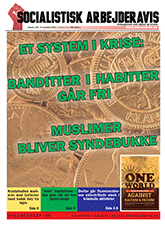Tema: Tyskland 1900-1933
- Tyskland 1900-1933
- Ian Birchall: Feedback: Some questions about the lost German Revolution
International Socialism Journal nr. 150, apr 16 – side 185
Note: It is not surprising that Tony Phillips has made a vigorous defence of the “classic” Socialist Workers Party position on the 1918-1923 situation in Germany. The argument is central to the SWP’s historical analysis. In order to argue that Leninism did not inevitably lead to Stalinism, it is necessary to show that there was an alternative.
- John Rose: Feedback: Revolutionary workers’ movements and parliaments in Germany 1918-23: A reply to Tony Phillips
International Socialism Journal nr. 150, apr 16 – side 191
Note: Tony Phillips provided a rather misleading account of my Marxism 2014 talk on Workers’ and Soldiers’ Councils in the German Revolution in the last issue of International Socialism. Nevertheless Tony does point to an unresolved argument about workers’ councils and factory councils at different stages of the German Revolution, and their relationship to parliament.
- Tony Phillips: Was the German Revolution defeated by January 1919?
International Socialism Journal nr. 149, jan 16 – side 185
Note: John Rose argued in his talk at Marxism 2014 that the German Revolution had effectively suffered terminal defeat by January 1919. The National Congress of Workers’ and Soldiers’ Councils voted in December 1918 to hand power to the National Assembly after elections to be held in January 1919.
- John Rose: Luxemburg, Müller and the Berlin workers’ and soldiers’ councils
International Socialism Journal nr. 147, jul 15 – side 113
Note: Two very important new books about the German Revolution were published last year: Working-Class Politics in the German Revolution: Richard Müller, the Revolutionary Shop Stewards and the Origins of the Council Movement by Ralf Hoffrogge and The German Left and the Weimar Republic: A Selection of Documents, translated and introduced by Ben Fowkes.
- Yusuf Timms: The KPD and the Crisis of World Revolution
International Socialism Journal nr. 140, okt 13
Note: This year marks the ninetieth anniversary of the “German October”, the aborted socialist revolution that came to mark the end of the post-war revolutionary wave that had washed away monarchical government from most of Central and Eastern Europe. For a time, in the autumn of 1923, there seemed a real possibility that a new front was about to be opened up in the communist revolution that had begun in Russia six years earlier.
- Ian Birchall: Being right is not enough: Some thoughts on Paul Levi
International Socialism Journal nr. 138, apr 13 – side 199
Note: John Rose and Sebastian Zehetmair are quite right to welcome the publication of David Fernbach’s collection of Paul Levi’s writings. There is still much to be learnt from the early years of the Communist International.
- Divided they fell: the German left and the rise of Hitler
International Socialism Journal nr. 137, jan 13 – side 183
Note: Eighty years ago, on 30 January 1933, President of Germany Paul von Hindenburg appointed Adolf Hitler to the position of Chancellor of the Reich. In the years preceding Hitler’s appointment the Nazis and their paramilitary units, the SA and SS, had already been engaging in a steady campaign of terror against the labour movement while the state looked the other way. On 30 January 1933 this terror was made legal.
- Colin Wilson: Sex and the German Revolution
Socialist Review nr. 366, feb 12 – side 22
Note: As part of LGBT history month, Colin Wilson looks at the how the German Revolution of 1918 led to significant new freedoms for lesbians and gays, and the role played by Communists.
- Mark Thomas: Germany's Forgotten Revolution
Socialist Worker nr. 2241, mar 11 – side 10
Note: Between 1918 and 1923 revolution erupted in Germany. Open class warfare gripped the country with uprisings, mass strikes and army mutinies. Armed workers clashed with counter-revolutionary paramilitaries.
- Volkhard Mosler: The German Revolution: Berlin’s days of hope turned into despair
Socialist Worker nr. 2131, dec 08 – side 6
Note: Our series concludes as Volkhard Mosler describes the moves to crush the revolution in January 1919
- Volkhard Mosler: The German Revolution: Workers’ councils had power to run society
Socialist Worker nr. 2130, dec 08 – side 6
Note: In the third part of our series Volkhard Mosler examines the movement that rocked Germany’s rulers in 1918
- Volkhard Mosler: The German Revolution: Horrors of war gave birth to new struggle
Socialist Worker nr. 2129, nov 08 – side 6
Note: In the second part of our series Volkhard Mosler looks at how the German left grew during the war
- Volkhard Mosler: The German Revolution: How a workers' uprising ended the First World War
Socialist Worker nr. 2128, nov 08 – side 6
Note: Volkhard Mosler opens our new series by looking at how revolt spread from the front to the factories in 1918
It is widely claimed that the 1918 November Revolution in Germany failed. But it succeeded in ending the First World War – the biggest and bloodiest war in human history up to that time.
- Neil Davidson: When history failed to turn (A review of Pierre Broué: "The German Revolution, 1917-1923")
International Socialism Journal nr. 108, sep 05 – side 181
- Ole Andersen: Den tyske revolution: Reformismens forræderi
Socialistisk Arbejderavis nr. 179, jan 00 – side 9
- Charlie Lywood: Tyskland 1918-23: Revolutionen der kunne have ændret verdens gang
Socialistisk Revy nr. 13, mar 99 – side 16
Note: Tyskland 1918-23 var præget af revolutionære tilstande. Charlie Lywood skriver her, at var revolutionen lykkedes, ville verden have set meget anderledes ud i dag. Og vi havde undgået såvel nazismens som stalinismens barbari
- Kevin Ovenden: Karl Liebknecht 1871-1919: Ja til revolution! Nej til krig!
Socialistisk Arbejderavis nr. 138, jun 96 – side 8
Note: Første verdenskrig splittede arbejderbevægelsen i reformister og revolutionære. Karl Liebknecht fastholdt sin krigsmodstand og argumenterede for nødvendigheden af revolution.
- Louise Madsen: Leon Trotskij og Kenth-Åke Anderson: "Kampen mot Hitler"
International Socialisme nr. 4, feb 93 – side 36
Note: Kampen mot Hitler indeholder 2 artikler. Den ene er skrevet af den svenske trotskist Kenth-Åke Anderson, og er en historisk gennemgang af Hitlers vej til magten. Den anden er skrevet af Trotskij under titlen "For arbejdernes enhedsfront mot fascismen".
- Lotte Mylendorff: Tyskland 1918-23: Opstand og nederlag
Socialistisk Arbejderavis nr. 16, jan 86 – side 6
Note: »Uden en revolution i Tyskland er vi dødsdømte«, sagde Lenin i 1918. Historien har givet ham ret.
- Juliet Ash: Clara Zetkin: A reply to Tony Cliff
International Socialism Journal nr. 14, sep 81 – side 120
Note: Tony Cliff’s article in International Socialism 2 : 13 on Clara Zetkin attempted to point out some of the grave complexities involved in understanding the development of socialist and feminist movements during the last 100 years. In doing so he employed a classic male leadership method, conveniently picking out from writings and correspondence of this period quotes from socialist women which would suggest a concern with issues considered important by socialists and feminists at present.
- Janet Vaux: Feminists in the Labour Movement
International Socialism Journal nr. 14, sep 81 – side 124
Note: A reply to Tony Cliff: Clara Zetkin and the German Socialist Feminist Movement in ISJ2:13.
The general truth behind the attacks by Zetkin and Kollontai on contemporary women’s rights movements is that civil rights struggles are reformist; they don’t really change things, but leave the basis of a divided class society intact. It is quite usual, and I think correct, to say that the 19th century women’s rights movements were a struggle on the part of bourgeois women to get equal rights with bourgeois men. But, at this time, the working classes were also struggling for many of the political and educational rights enjoyed by bourgeois men.
- Tony Cliff: Clara Zetkin and the German Socialist Feminist Movement
International Socialism Journal nr. 13, jun 81 – side 29
Note: Alienation is the core of capitalism. Under this system people treat each other not as ends in themselves, but as mere means; not as people, but as objects. This also applies to sexual relations both in the bourgeois and in the proletarian family. But from the fact that women of all classes are alienated one should not draw the conclusion that they all react in the same way to this alienation. On the contrary, in the final analysis the proletarian woman is spurred on by it to revolution, the bourgeois to reaction.
- Contents 38-39 – Special Issue: Fascism, Stalinism and the United Front, 1930-34 by Leon Trotsky
International Socialism Journal (1st series) nr. 38-39, aug 69
Der blev fundet 23 artikler
Til hovedgruppe – Til temaoversigt
- Leder: Det mener vi
- Interview: Kampen mod umenneskelige fængslinger af afviste asylansøgere nytter noget
- Udenlandske chauffører har usle vilkår i Danmark
- “Grøn” kapitalisme – kun grøn, når der kan tjenes penge
- Derfor går finansverdenens nålestribede amok i kriminelle aktiviteter
- 1968: Året der forandrede alting
- Mere end en Saudi PR-katastrofe
- To år med Trump har mobiliseret millioner til modstand
- Almindelige menneskers historie: 3. De første store stater og de første klassekampe



 Newsfeed
Newsfeed